Get posts by email
Late Elementary Learner-Centric, Family-Friendly Homeschool Curriculum
February 19, 2013
I just love those wordy curriculum post titles.
Last month I finally finished our homeschool plans for Fall 2012. Ha! More specifically, I finished Laurent and Brienne's curriculum planning.
At the start of Celine's 8th grade year, last September, I spent a lot of time wrapping my head around her needs. This took a fair bit of mental energy and I ran out of steam before finishing my curriculum planning for the youngest two.
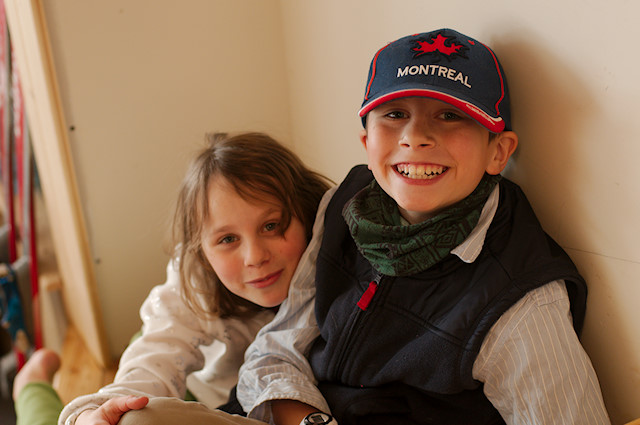
Learning happens all the time
The funny thing is, and homeschoolers will attest to this, your school routine, learning routine, unschool routine - whatever you want to call it - lives, breathes and moves whether you've planned it all out it or not.
Learning happens because life happens. Learning happens in the play, in the lessons, in the reading, in the watching, and in the discussions. Learning happens whether I've made a plan or not.
Some homeschoolers are ok with just this. They don't have the need to explain how they homeschool or to write out their curriculum. (Many homeschoolers are not afforded this luxury because of state or provincial oversight.) And many homeschoolers just follow someone else's curriculum so there is no need create a custom curriculum in the first place for their child.
I like making plans
I am not one those homeschoolers. I am a planner. I create custom curriculum for our children. (Please click here for how I define curriculum). I don't have authorities breathing down my neck but I am not immune from that possibility and I want my plans to be in order, if and when, someone asks to see them.
I'm also a writer and memory keeper. I simply cannot escape my need, my drive, to put our homeschool plans on paper. When my kids were little these were one page documents, spreadsheet style. The learning need in one column, the resources, tools, teaching methods in the other.
The plans are more in depth these days but I go about the process the same way.
How I create a custom curriculum
My homeschool planning starts with evaluating who my children are and asking for Divine wisdom to meet their needs and guide them to where they need to go.
I ask a bunch of questions. Who is my child? What do they need right now to help them succeed? What do they need in the future? What are their interests? What are their strengths? What are their weaknesses? What are their goals?
From these answers I design a curriculum for each child. A curriculum that is both learner-centric (designed for the child specifically) and family-friendly (takes into account the realities of home life and limited energy and resources).
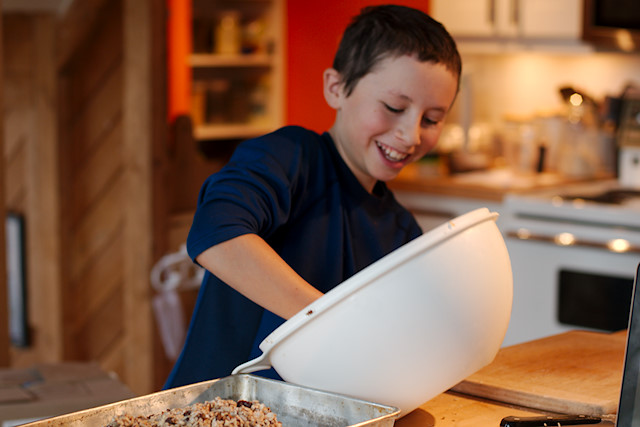
The curriculum is not just about the child, it's as much about the family needs and resources available. Our kids learn in the context of family life, not separate from it.
I sometimes wonder if I spend too much time planning, since life never goes according to plan anyway. (I've learned there are some seasons of life when you're better off putting your energy into observing, recording, and collaborating with what's already happening in your children's learning life vs. crafting a master homeschool plan.)
I know that my time spent planning is not wasted though, especially as my kids get older.
Yes, homeschool plans change. Our homeschool plans are always subject to change, just as we as people are subject to change and growth. (This is a key strength of homeschooling, the flexibility to try new things when the old isn't working). But plans at least give us a place to start. Plans can provide some structure and routine as a base. That base might serve simply as a launching pad for learning in a completely new direction but at least you've started somewhere.
A late elementary homeschool curriculum
Let's dive into Laurent and Brienne's current curriculum. This was started last fall and continues this winter.
We will probably take a break in spring and pick up certain components again in summer. Math, for example is usually a slow go, year round learning component in our elementary curriculum. Short and sweet lessons spread out over the whole year work better for my children than intense math lessons during the typical school months.
In theory, I will reassess and make new plans again next fall. Next year - 2014 - we have a large life adventure planned that will be the curriculum, so my fall planning may hopefully be easier.
But let's get this post published before fall!
Just like everything we do, this curriculum is a living work in progress. The plan, the curriculum, the resources - they serve our needs. Not the other way around. We are continually tweaking and adapting.
Brienne and Laurent are in the late elementary years and in spite of a 21 month age difference they track at a similar developmental stage, since young girls tend to mature faster than young boys (older brother, younger sister combo). This works well for me since I can group them together for their foundational academic skills - math, reading, & writing specifically. They do most of their learning and life activities together but have lots of time also for their individual interests (they are very different people!)
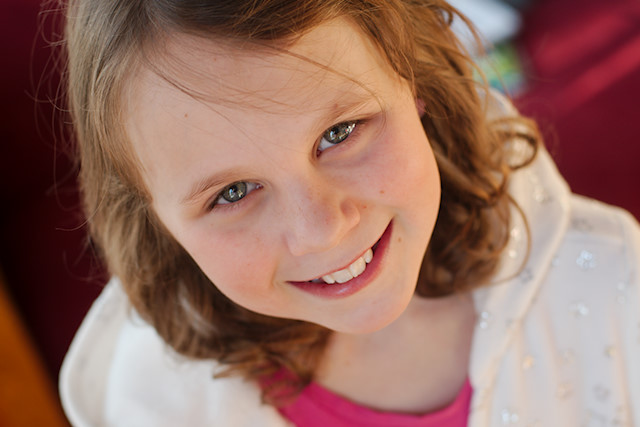
There are many elements to this curriculum, because it's a complete course of study. These elements are woven into our days, weeks and months.
Bible & Hymn
This is a family study. We're currently listening to the Mars Hill Doctrine series. See here for more about our kids' religious education.
I have wanted, and at various times attempted, to teach hymns to our kids. For the simple reason that hymns communicate so much about our faith in such a timeless and accessible way - through music. I learned many hymns as a child and those will come to me often in situations when I need the encouragement and wisdom from those words. And most often those are words straight from the Bible itself, just in another form.
I haven't been as diligent as I want to be in teaching hymns to my kids. I trust the Spirit will speak to them in other ways when they need it. But I still keep trying to introduce hymn study and singing. This winter I want to choose 12 hymns, one for each month. Buy a good, high quality mp3 of each hymn and then consciously each month work that hymn into our weeks. Listening, singing, discussing the words, the history of the song, etc.
There are packaged resources for this but I have been reluctant to purchase them because I usually like doing things myself. Sigh. Contented at Home has a free Hymn Study for Homeschoolers that I plan to use as a launching point.
Character & Community
Community starts at home, in the family, and for our younger two especially character development revolves very much around sibling relations. The resource I most often use, in the context of character development, is For Instruction in Righteousness: A Topical Reference Guide for Biblical Child-Training. This is a use-as-needed reference. I don't do "character building" exercises or lessons with the kids - everyday family life and outdoor pursuits provide enough of those opportunities.
Design & Art
When our kids were little this was called crafts. Brienne's current creative interests are photography and creative writing. Laurent affections remain with his first creative love - drawing. We seek resources as needed to support these interests.
For Laurent's birthday this month he will be receiving new art supplies and tools (a Copic Airbrush). Brienne's tool of choice is her iPad which allows her to pair photography and writing. Her favorite app for this is Notability.
Electronic tools are being used more and more in our home for creative expression and art. However, hands-on activities are still important. For a thorough list of all the craft supplies we use see here and here.
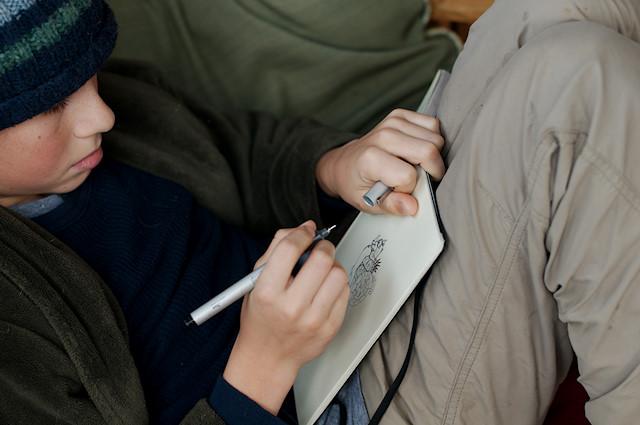
Entrepreneurship & Stewardship
Teaching our kids how to "earn a living" is important for us. Of course the best way to teach this is to model it and actively involve children in household and personal finances as they grow. And to support their own money making efforts and initiatives.
Laurent sells art and because he is not wired to value money all that much (ENFP) our job is largely to teach him the value of his skill and to not give it away for free, unless he wants to. His younger sister helps also in this regard, she has a much keener interest in finance. She'd be a great business manager for him one day!
Brienne is working on her own money making project right now. I'm not sure if that will see the light of day but she's got a goal and she's creating a product, useful skills to learn.
All our kids receive a small weekly allowance. This is so we can teach them principles of saving, giving, and spending. This allowance is not dependent on household work or chores, they get this allowance because they are members of the household. Every household member gets an allowance, even Damien and I.
Household chores are done because you belong to household, simple as that.
Our kids' giving mostly helps buy birthday and Christmas gifts for our three sponsor children with Compassion.
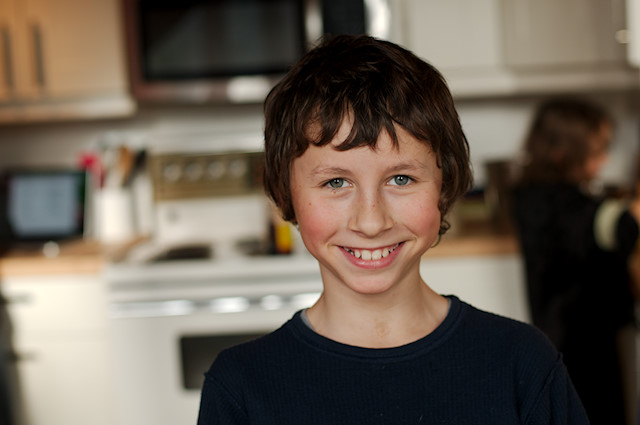
French
This is not an active study for our younger two. We live in a French culture but have a very anglophone home so their learning is slow. I am focusing our French studies on Céline and myself right now.
I have a fabulous guest post coming soon on teaching second languages to our kids. I should follow the advice in that post!
Health & Wellness
Health and wellness is a core family value and is taught mostly in the context of everyday living. Cooking and eating, outdoor play and exercise, and adequate rest - these are simply part of our life. And of course weekly outdoor activity together.
Last fall all the kids took Taekwondo lessons, en français, twice a week. We're also did family fun running races throughout the fall. Turns out Brienne is a competitive runner. We will be looking for opportunities in the future for her to explore this interest and gift.
This winter is all about skiing (and snowboarding for Laurent).
History, Geography & Cultural Studies ~ World Study
Almost four years ago I wrote about how we study the world through reading and creative play. This was back when all of my children were elementary aged and we had an excellent English library resource. Oh how things change!
My approach for Céline's elementary years of world study was interest-led reading, supported with family discussion and other investigation (internet research, videos, mapping, further reading, hands-on experiences, etc.).
With my younger two I've had to take a different approach because 1) they are not strong individual readers like Céline (Céline devoured so many excellent historical fiction books that I knew she was learning a lot about history without my teaching it) and 2) we don't have access to lots of English library books to explore history.
I use The Story of the World as our history base. Currently we're on Volume 2. I use Activity Book 2: The Middle Ages, online media (YouTube videos & documentaries), and online articles to supplement our reading.
My younger two kids, by virtue of where we live (our limited access to resources) and their own interests, have much less of a history focus to their elementary studies than Céline did.
I like to use resources as "launching pads" for history, geography and cultural studies. I use everyday experiences, conversations, and media exposure as natural launching pads for world study and exploration. A launching pad is simply a point of origin that launches you into further inquiry and study.
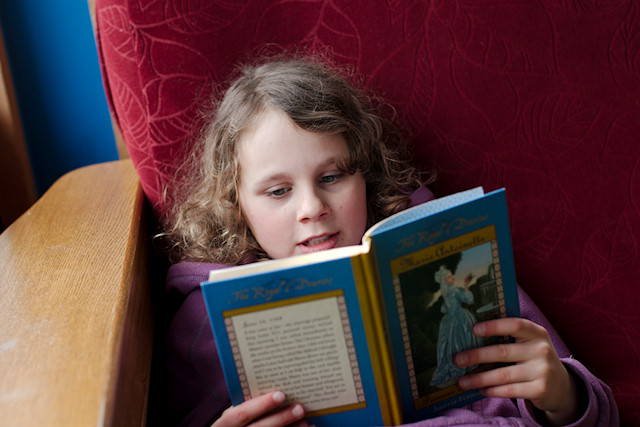
I use The Story of the World as a launching pad as well as a general overview for elementary and middle school history (taught over the course of many years).
Another history "launching pad" I like to use in this life season is The Writer's Almanac, which we listen to on occasion. I have to screen these for appropriateness for children, but mostly these are fabulous daily poetry readings and history lessons available for free. I love the literary focus of these history lessons.
A couple other history "launching pad" resources are:
- This Week in History. I don't use this because it has a very American focus.
- This Day in History, free History Channel video.
Can you recommend any history launching pad resources?
Homemaking
This school year's big homemaking focus is kids in the kitchen. This winter, in addition to all their previously learned homemaking skills, the kids are learning how to make healthy snacks. I teach and support as necessary.
Math
I prefer straight out-of-the-box, no thinking or time required on my part math materials. This works well for our family. And it's probably the only component of our curriculum that I mostly outsource. I can't say math is always "joy oh joy" in our house but it's not drudgery either. Honestly. Join my Motivation Matters talk for more on how I do that.
Right now we use Teaching Textbooks for elementary math. Céline did most all her elementary math with Math U See and is finishing her basic math with Khan Academy online. Brienne and Laurent do their lessons together. In the last couple years we've taken a math-all-year approach, spending a small amount of time doing math lessons most days, all year round.
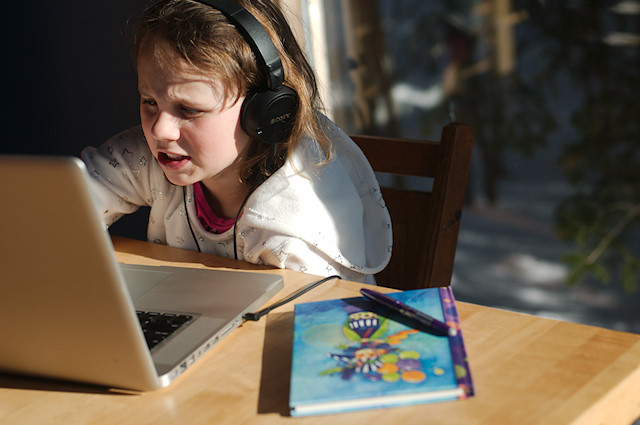
Outdoors & Adventure
Another one of our core family values. This part of our children's curriculum ties in a lot with health and wellness but is broader than that because we are endeavoring specifically to teach our children a love of wild places and an openness to experiencing the outdoors and adventure.
We teach this mostly through example and our family life style. Our weekly hikes and regular backpacking are a part of this. So is where we live and the attention we pay to outdoors in our everyday living. In 2014 we plan to spend six months living outdoors on a trail. This year we will start getting ready for that, big time.
Right now we're listening to AWOL on the Appalachian Trail.
Reading
I shared Laurent's reading struggles in this post last summer. The goal for me is to keep Laurent's natural drive to read intact (ie. to keep his reading self esteem high so he keeps working at it without shame) and to teach him the skills for decoding. We use a multi-pronged approach.
To teach Laurent how to read we use Reading Horizons. His reading skill has improved greatly in the past year. See this post for my review of that program.
To keep Laurent's interest high (because it's hard work when reading doesn't come easy) I use anything and everything to help him access information and stories - audio books, apps, and graphic novels to name a few.
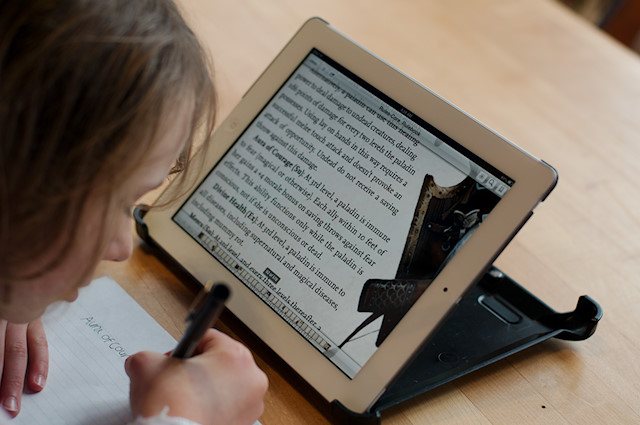
Laurent has a very keen interest in RPGs, all my kids do. RPG game play books, character histories, bestiaries - all of these are fabulous reading materials for Laurent. He's highly motivated to read these and there is usually a significant artistic component. That motivation coupled with the graphic artistry helps him push through some of the difficult passages (which we help him with when necessary.)
We are so pleased with Laurent's progress in reading. But also very pleased that Laurent still approaches reading with enthusiasm and interest, after years of practice. Keeping his "reading self-esteem" intact has been really important to me and I feel we've done a good job with this.
Brienne has not struggled with reading the way Laurent has but she is not the voracious reader Céline is either. That's fine.
Brienne is usually so engaged physically with her world that she doesn't do a lot of quiet reading. She's also a very auditory learner. I am encouraging her to do more reading this winter by assigning a small amount of reading on a regular basis. This doesn't feel like an assignment so much as a reminder for her. (But unless the house is quiet she's quite distracted by activity around her.) We're using our personal library of kid books for this reading.
Audio books are an important part of our days and I still read aloud to Brienne and Laurent almost daily. These are the last couple years of that practice I'm sure, so I'm savoring that.
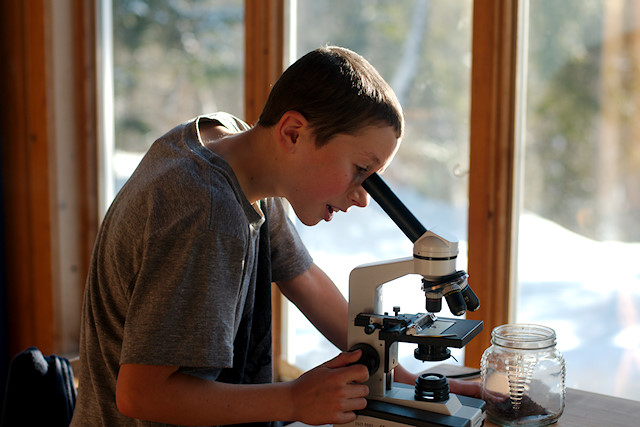
Science & Nature Study
I don't teach science lessons in the elementary years. Rather, science is a topic of everyday conversation and application. The kids have access to science tools and will use these at their own discretion and will.
Both Damien and I have a scientific bent for looking at and understanding the world. My interests cover biology and the study of living things, Damien's interests covers pretty much the rest. Damien reads a lot of science and technology articles online, not fluff either, which he shares with our family.
Last fall, when Brienne started to show an interest in kitchen experimentation, of the edible and nutritious kind, I decided to buy some science experiment books for the kids. They've never been used! Maybe I need to leave them out in a more prominent location than the bookshelf.
One resource that Brienne uses for science study is Herb Fairies. Herb Fairies is a digital product produced by Learning Herbs. Herb Fairies was available for a limited time last summer. It will return to market sometime this year.
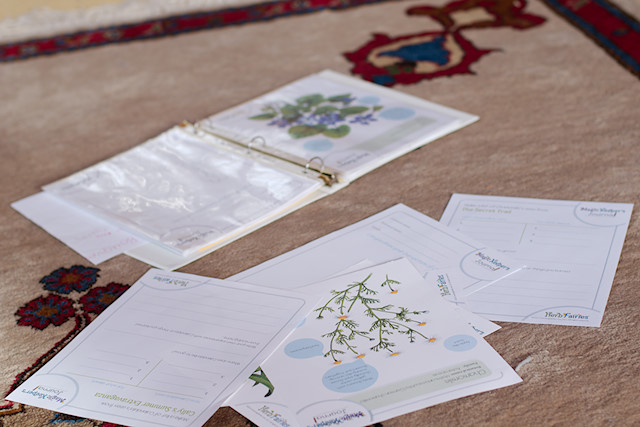
I'll let you read all about it on the website but it's a really cool "program" for children to learn about herbs, in a story context. (See Brienne's Herb Fairies review video for more information.)
Technology Literacy
This relates to science but is definitely distinct and on its own in our estimation. The way we see it - as workers in the knowledge and technology economy - understanding and using technology is the new literacy. We think being able to access and use technology will separate the haves from the have nots in the future, if this isn't true already. We live in an increasingly technologically complex world and we have to prepare our children for this reality.
For our youngest kids this just means access to technology suited to their needs. A desktop computer, an iPod (for audio resources and apps), iPads, digital cameras, and all the software that goes along with those are a regular part of Brienne and Laurent's day. They use these tools for reading (e-books are important resources for us), accessing information and researching, creating art, and for entertainment. We use these tools for living and learning.
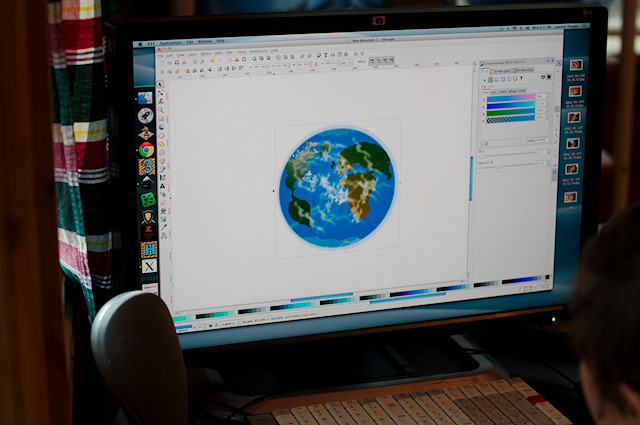
Our goal with technology literacy is that our children grow to be comfortable using technology (to not be afraid of change and new ideas) and know how to use specific technologies to their best advantage. This will be different for each of our children based on their unique intelligence and gifts.
I have a post in the works (about 1/2 written) about technology literacy and the tools each of our children uses and why. That post is now published here.
Writing
This is where I wish I had finally finished my elementary homeschool curriculum series. All I have left in that series are two posts on writing, which are mostly written. If I had I finished that by now I could point you there to explain our writing curriculum.
Luckily, I can point you to the The Writer's Jungle and say "this here" is what we mostly do. Laurent is in the Partnership Writing and Faltering Ownership phases. Brienne, a natural writer, is in the Faltering Ownership phase.
Very briefly, Brienne and Laurent's writing activities include:
- Copywork
- Handwriting practice (Brienne) & Typing drill (Laurent)
- everyday writing - letters, e-mails, lists, notes, comic strips, poetry, personal journaling, etc.
- interest-driven writing projects
- Freewrite
- and this winter, a Playful Learning ecourse for Brienne
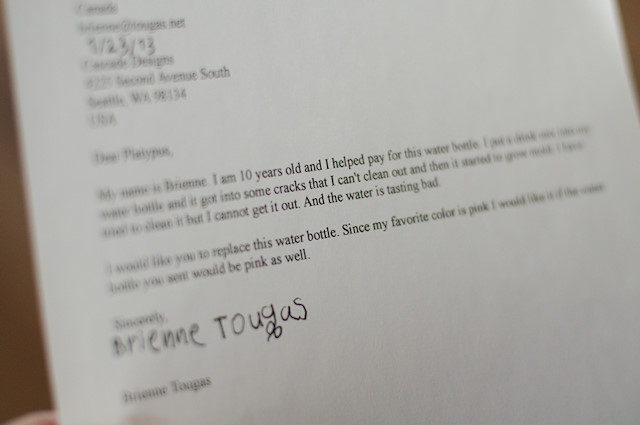
Though there is a lot of pen and paper writing (literally pen, my kids have always preferred nice pens to pencils), our kids' technology tools are being used more and more to make writing very accessible, easy and fun. They love to send silly e-mails to each other and me. The kids like the Notability app to write illustrated stories, recipes, and lists.
That's a snapshot of our late elementary curriculum.
(Also, just a heads up that this week's ebook bundle from Bundle of the Week is a homeschool bundle. Five homeschool e-books for $7.40.)
Filed Under
Resource Library
-

Brynn Dahlquist on Feb. 19, 2013, 6:50 p.m.
We use iTunesU. It provides free courses from major universities mainly in the U.S., but internationally as well. You can also get the courses translated, but I believe there is a cost for that. It is the entire audio and visual components of the lectures directly from classes each week, syllabi, chapter resources (normally in e book fashion), interviews, and a course outline. It is like Khan Academy on steroids. They have everything from business and humanities, to microbiology, to computer science.
-

renee on Feb. 19, 2013, 6:54 p.m.
That sounds great Brynn! I've never heard of it. Both B & L have their own iPads now so this could be a great resource for them.
-

Melissa on Feb. 20, 2013, 3:36 p.m.
I've sampled some of the courses available...it's definitely worth your time to look at them, particularly as the kids' needs reach towards university level learning (regardless of whether or not they attend one). My recollection is that the data downloads can be heavy for some files, so be mindful of that if you have to budget how much you download.
-
-
-

Anonymous on Feb. 19, 2013, 7:36 p.m.
This all sounds so great. However I do have to say it makes me a little uneasy (tired, really) thinking about all that I will have to do in the future with my kids (right now only one is homeschooled, the others are too young). I guess its just one day at a time. But there is so much I want to do and teach them all (when its time).
-

Michelle on Feb. 19, 2013, 7:39 p.m.
Thanks for sharing your elementary curriculum! I decided to hold off ordering Herb Fairies last summer because we had so much else going on, and now I am anxiously waiting for it to be available again. Can't wait to use it!
-

Tonya on Feb. 19, 2013, 8:31 p.m.
Hi Renee, For hymns, we really like Peace Like a River (The Hymns Project) by Chris Rice - really nice! Thanks for sharing all of this, truly, your enthusiasm has encouraged me to really spend time praying for each of my children and then focusing a bit more on their needs and coming up with creative ways to meet them.
-

Kay on Feb. 21, 2013, 7:25 p.m.
Such an impressive list! Thanks for all of your insight and a very helpful glance at your work. My son (3rd gradeish) is very much into science and observation right now and I like your ideas! I am wondering what it is about the Mars Hill Sermons that you like? I've been looking for Bible curriculum and have run across that name often (some of it in controversy), so I was just wondering what draws you to it. Peace, Kay
-

renee on Feb. 21, 2013, 9:02 p.m.
Damien chose the Mars Hill Doctrine teaching. I am mostly unaware of the controversy. Damien mentioned a bit to me but I didn't go looking for more information. Apparently there are two Mars Hills so maybe you're thinking the other Mars Hill? I tend to stay away from Christian controversy. In brief, what we like about this series is that it is Biblically conservative but culturally relevant.
-
-

Catherine Forest on Feb. 23, 2013, 3:21 p.m.
Very inspiring, Renee. We find ourselves in a similar situation (English environment with no French resources), except that there are so few online French resources/ebooks available... Our girls are hitting the bored phase and I am starting to wonder if we are providing enough for them to nourish their souls... Their needs keep changing and following their interests doesn't seem to be enough right now... I am feeling vulnerable and full of questions right now, a place I haven't visited in a while... What a ride this is!
-

renee on Feb. 25, 2013, 10:23 p.m.
Catherine, I totally hear you. I live on the street called "vulnerability" with regards to our kids education and our lifestyle. Moving to a place with no homeschoolers, very few English resources, very few Anglophone friends for our kids, etc, etc. Our kids are doing well because we are rooted very deep in relationship with each other and we actively and diligently seek resources from wherever we can find them. Even so I had a little freak out about a week ago about this and like Damien reminded me, parenting is full of questions and concerns, regardless the path you choose. If it wasn't this, it would be something else. I think boredom from time to time is really ok (I know you know this), but it's uncomfortable for us and the kids. My kids largely follow their interests in life and education but I like having some other ideas and resources to pull in when, like you say, "following their interests doesn't seem to be enough". Ideas to inspire and challenge them and that's one of the reasons I make a curriculum (as detailed in this post) for them vs. simply a straight "follow the interest path" or strict unschooling approach. It's what works for us, but it's not without questions or vulnerability. I think that's just the reality of parenting, regardless. Lots of hugs to you.
-

Catherine Forest on Feb. 26, 2013, 3:14 a.m.
Thank you Renee. It feels so good to really, truly feel understood. I know you really do understand how I feel. Since reading Brene Brown's book, I am really welcoming that vulnerability in my life, but it catches me by surprise sometimes, just like it does since two weeks. It is very unsettling and uncomfortable. But as Damien wisely told you, parenting is all about questions and concerns... and adaptation. I am really liking what you are sharing here. We are actively looking for more french ressources and ebooks for our girls (we might have found a library for audiobooks in Switzeland!). Lovexx
-
-
You can subscribe to comments on this article using this form.
If you have already commented on this article, you do not need to do this, as you were automatically subscribed.






Judy @ Contented at Home on Feb. 19, 2013, 2:04 p.m.
Thanks so much for sharing my Hymn Study series, Renee! I hope you and your family will enjoy them. Your thoughts about the words of hymns being a rephrasing of Scripture are right on. I believe that's the most important reason to learn and sing the hymns of the church.